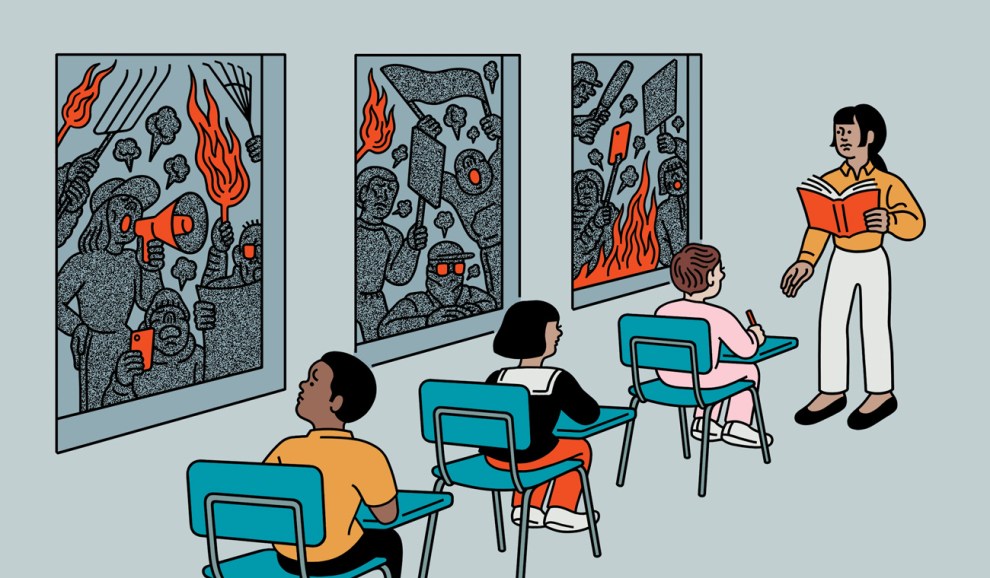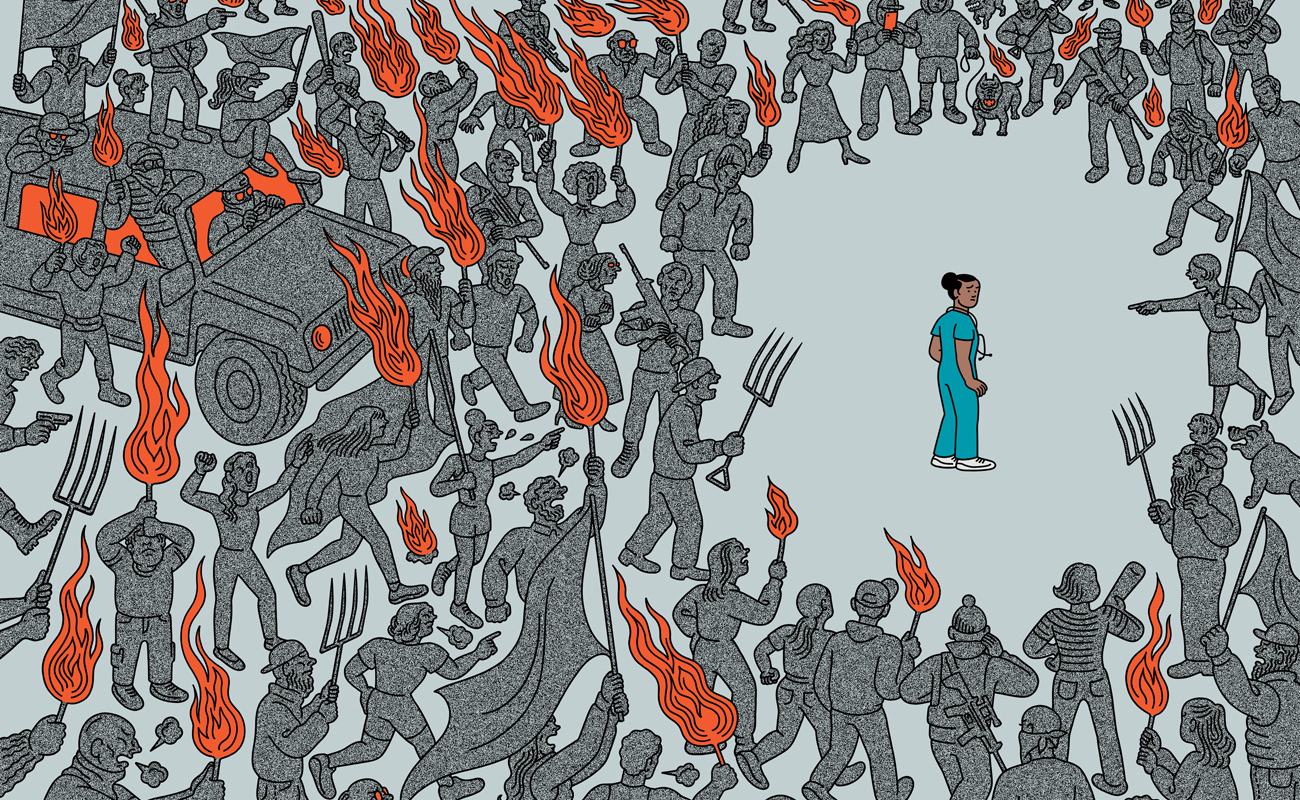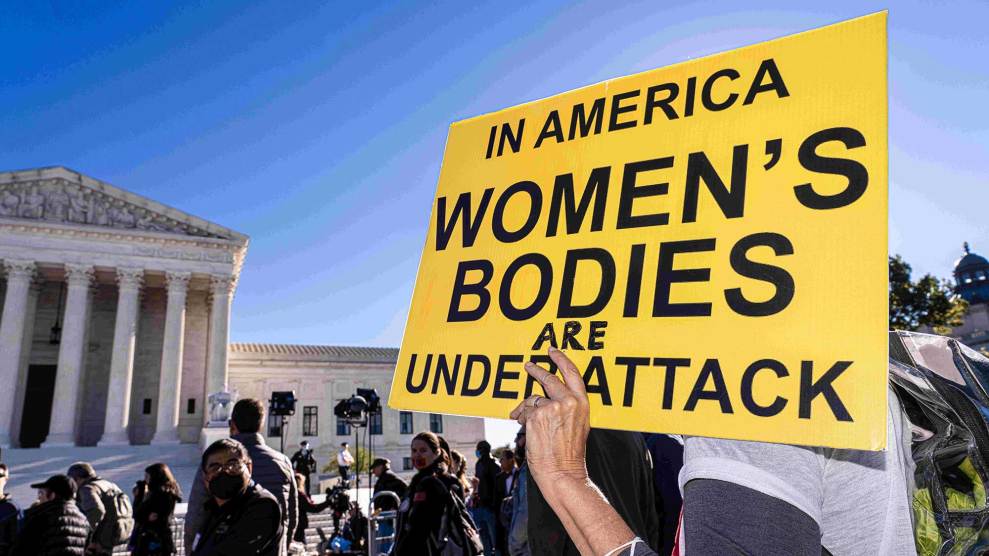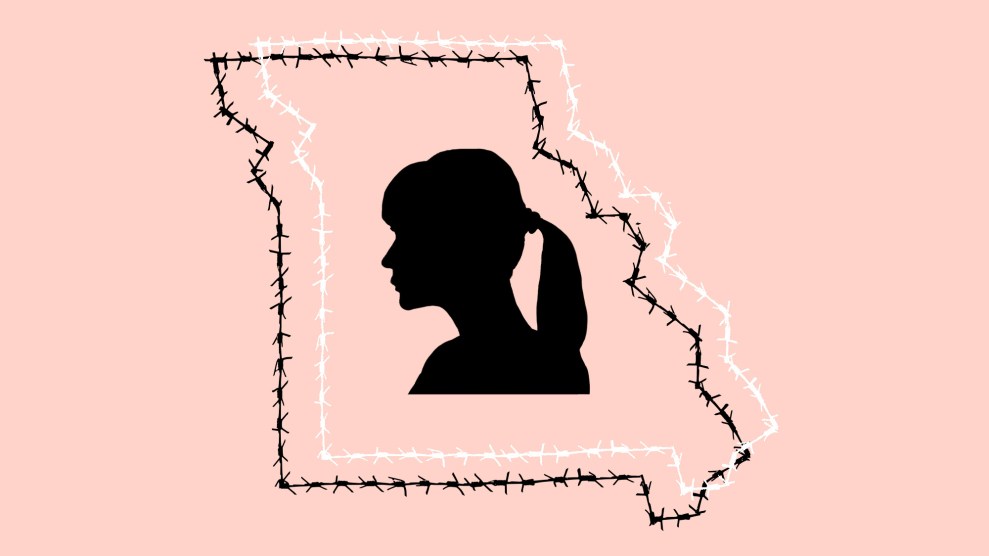It was a cold, blustery weekend in February when Neesha Davé opened the door to her Austin, Texas, home and found a process server standing on her front step. She felt sympathy for the woman waiting in the morning wind and rain, even after she awkwardly handed Davé a 30-page document they both knew was bad news. For months, Davé had prepared for the possibility that this day might come. She read through the document, then scanned each page with her phone, and sent it to her lawyers.
The document was a request to depose Davé because, as the deputy director of Lilith Fund, she helps pregnant people in Texas obtain abortions. Beginning on September 1, 2021, abortions after about six weeks of pregnancy were banned in Texas under a law known as Senate Bill 8, or SB8. At the time, abortions in roughly the first half of pregnancy were a constitutionally protected right under Roe v. Wade. SB8 sought to outflank Roe by placing the task of enforcing its ban on individuals rather than the state of Texas. Under the new law, any individual can sue anyone they suspect of helping a pregnant person get an abortion in Texas after six weeks, for a minimum of $10,000 in damages. This vigilante scheme was meant to stop SB8 from being overturned by courts, despite its blatant violation of Roe; if the state can’t enforce its abortion ban, the law’s proponents argue, then a court can’t order them not to enforce it, either.
When the Supreme Court overturned Roe on June 24, the legal status of abortion in Texas was thrown into chaos. The specifics are still working their way through the courts, but what is clear is that abortions are banned with almost no exception. Texas’ 1925 abortion ban is now in effect once again: performing abortions is illegal, as is helping someone obtain an abortion, opening anyone caught helping to end a pregnancy to fines and lawsuits. A second ban enacted last year will take effect on August 25th with draconian punishments for abortion providers.
SB8 helps enforce this post-Roe regime: It allows vigilantes to piggyback on any cases brought under the bans and win civil suits with ample bounties. Vigilantes can also go after anyone involved in a suspected abortion without a prosecutor’s involvement, meaning that even in the state’s liberal enclaves where elected prosecutors have promised not to prosecute abortion cases, SB8 will allow individuals to become the enforcers.
As Davé stared down at the document she’d just been handed, she got angry. This stranger who had just appeared on her doorstep was a warning that the other side had done their research on her—and they wanted her to know it. “The only reason that they would hire a process server to serve me at my home is because they wanted to use fear and intimidation as a tactic,” she says. They could have sent the packet to her lawyers. But they didn’t. This is part of the menace of Senate Bill 8: It is not only an end-run around the right to abortion, but also a weapon of fear and surveillance. Everyone must be on their guard. Everyone is being watched.

The lawyer who served Davé was surely aware of the psychological warfare embedded in SB8 because he wrote it. Jonathan Mitchell, a former Texas solicitor general who once clerked for Supreme Court Justice Antonin Scalia, had at first floundered during the Trump years. He lost out on several Trump administration posts and law schools passed over him as his fellow conservatives shuddered at the legal implications of his radical ideas. But in 2019, while running a one-man law firm, he began building an anti-abortion campaign at the local level, persuading more than 30 Texas cities to pass their own abortion bans with a legal gimmick he had first floated in a law review article: Maybe those bans could be kept out of the courts if they relied on private citizens to enforce them.
Those city bans were largely symbolic and received little press. But the following year, he got the opportunity to test his theory on a bigger stage. When a Republican state senator told Mitchell he was planning a bill that would outlaw abortion in Texas at about six weeks, Mitchell volunteered to bulletproof it against judicial scrutiny. “Give me the pen,” Mitchell said, “and I’ll give you the language.” (Mitchell did not respond to a request for comment.)
Now, with Davé, he had an opportunity. Last October, a federal judge blocked SB8 and the law briefly blinked out of force. In that time, Davé’s abortion fund and the North Texas Equal Access Fund, run by executive director Kamyon Conner, each helped finance at least one abortion beyond SB8’s approximately six-week limit. When a different court restored the law days later, they became vulnerable to SB8 litigation because the law allows vigilante enforcement suits even for abortions performed while the law is not in effect—meaning the law can never truly die. Mitchell pounced. He asked a court for permission to depose both Davé and Conner to dig up the identity of their affiliates and donors—and presumably to sue them, too.
That early morning knock on the door, the ominous legal papers, and the knowledge that someone out there is looking for a chance to sue you are the features of a dystopian new trend: The rise of vigilante enforcement to reverse progress and entrench physical and psychological control over women, LGBTQ people, and people of color. It’s not just pregnant people whose bodily autonomy has succumbed to the mob in Texas. Laws like SB8 now reach into school bathrooms, classrooms, and sports, targeting both the rights of transgender and LGBTQ people and what is taught. Following Texas’ lead, two states passed SB-8 style abortion bans; around a dozen more have considered doing so. Several more states have brought SB8’s vigilante enforcement mechanism into schools: 192 bills across 40 states have sought to limit classroom instruction on gender, sexual orientation, race, and American history since January 2021, according to running data gathered by PEN America. Forty-six of those would be enforced by private citizens if passed. There is also no telling how this playbook might be expanded. Under the same legal logic, laws could be passed to empower citizens to harass voters at the polls, or to incentivize neighbors to report undocumented immigrants.
These laws do not stop at targeting society’s most vulnerable. They also attack the legal and social norms that underpin our system of government. They turn citizens into spies in a surveillance scheme more reminiscent of a totalitarian state, and shred the vital principle that the laws are applied equally to all people.
These laws “allow you to stalk, surveil, harass, impede upon individual’s constitutional rights,” says Michele Goodwin, a specialist in constitutional law at the University of California, Irvine School of Law. “And that is why this is so dangerous to democracy.”

For Ghazaleh Moayedi, SB8 felt like an extension of the surveillance she already experienced as an abortion provider in Texas, but it also began to change everything. When the law took effect in September 2021, she stopped providing abortions in Texas. While her OBGYN practice remained in Dallas, she began making the long drive to Oklahoma where she could provide abortions after about six weeks of gestation, the new Texas cutoff. Her patients began arriving later in their pregnancies after navigating travel and awaiting an appointment. Meanwhile, in Texas, she watched as the law created fear among doctors and nurses that affected how they cared for pregnant patients. Is this miscarriage legal to take care of? Can they discuss abortion with a patient whose pregnancy is dangerous or unviable? Health care itself was faltering under the omnipresent eye of the new law.
This spring, SB8 reached a new milestone: It had been in effect almost as long as a pregnancy, which means the first wave of people denied abortions in the fall began to give birth. “The past month, I have personally noticed a much higher volume of deliveries than we typically have in these months,” Moayedi told me in early May. “I’m hearing from patients that they tried to get an abortion but couldn’t. So those people are all delivering right now.”
For them, the surveillance state ushered in by SB8 has forever altered the course of their lives, breaking democracy’s core promise of freedom to determine one’s life path. “You cannot have state-mandated reproductive laws taking away these choices from women in a country and a robust democracy,” says Erica Chenoweth, a Harvard professor who studies political violence and mass movements. “They’re just incompatible.”
Texas has always kept a close watch on abortion providers and their patients, including mandating that abortion patients’ identifying information (name, age, marital status) be reported to the state. But under SB8, scrutiny has been expanded and weaponized: When the law took effect, a Texas anti-abortion group set up a website for people to submit tips about abortions performed in violation of SB8 and promised to “do the rest.” The portal didn’t last, but it also wasn’t needed for the law to have its intended effect.
It is under this heightened surveillance that, in April, Texas sheriffs arrested a 26-year-old woman named Lizelle Herrera after she went to the hospital with either a miscarriage or a self-induced abortion and someone there reported her to the cops. She was placed in the county jail and her bond was set at $500,000. The charge was murder. Local groups helped her post bail and organized protests, bringing media attention. Days later, now at the center of a national news story, the district attorney dropped the charges, admitting that Texas law exempts pregnant women from murder charges for self-induced abortions.
Herrera’s arrest following a tip from hospital staff encapsulates the shift toward an authoritarian surveillance state set in motion by SB8 and its corollaries around the country. Friends, neighbors, and even healthcare providers are now spies and liability is spread to everyone. Prosecutors were never going to be able to use SB8 to go after Herrera because it can only be enforced by civilians. But that detail did nothing to stop the new surveillance system from ensnaring her. “Of course this had nothing to do with SB8 and everything to do with SB8 at the same time,” Moayedi says.
Hererra’s case demonstrated that SB8’s private enforcement mechanism is working. “Encouraging citizens to spy and denounce each other, it feels extremely authoritarian,” says Barbara Sutton, a professor and chair of the Department of Women’s, Gender, and Sexuality Studies at University at Albany, SUNY.
Sutton’s scholarship on the intersection of abortion and democracy is informed by her experience growing up under a military dictatorship in Argentina. After the violent regime ended in 1983, the country transitioned to a democratic government, yet it still took decades of sustained activism to legalize abortion in 2021. “To have abortion rights, you need all the mechanisms of democracy to be working properly,” Sutton says. If abortion rights herald the success of a new democracy like Argentina’s, then they’re also the canary in the coal mine for democratic backsliding: A blinking alert that other rights for marginalized people will fall next.

Last May, when Tennessee banned transgender children from using the school bathroom that reflects their gender identity, the press covered the law as part of a growing war on trans kids. But few reports noted that it was also the first such law to rely on private individuals to enforce it. Texas’s SB8 followed days later. That June, Florida enacted a law banning transgender girls from playing on girls’ sports teams, also enforced by civilians: other students who could now file lawsuits about their classmates.
As these Republican-backed bills using private enforcement to block abortion and marginalize minorities proliferated, constitutional scholar Jon Michaels took note. A professor at the UCLA School of Law, he began to see this trend as part of Trumpism’s growing authoritarian strain. Last September, he and David Noll of Rutgers Law School predicted in a New York Times op-ed that SB8 was just the “tip of the iceberg” in the conservative movement’s war on vulnerable groups.
In January, after the Supreme Court virtually invited more states to mimic SB8’s civil enforcement mechanism when it declined to block the law, Michaels warned, this time in the Washington Post, that such laws were both a symptom and accelerant of “democratic decline.” Some colleagues told him to calm down, but the more he examined SB8 and its progeny, the more alarmed he became.
Soon private enforcement laws spread from bathrooms and locker rooms to classrooms. In Florida, the “Parental Rights in Education” law, commonly referred to as “Don’t Say Gay,” banned discussion of sexual orientation and gender identity in kindergarten through third grade and severely limited it for higher grades. Lawmakers wrote the bill so that parents can enforce the law by suing Florida’s cash-strapped school districts.
By this spring, dozens of states had proposed laws to similarly limit discussion of sexual orientation and gender identity, some enforced through a vigilante process where parents (and in some cases anyone) can file complaints with the state or lawsuits against the schools where their kids learn. In New Hampshire, anyone can sue a school or school district for violating its vague rules on how to teach about race, sex, gender, and other sensitive issues, and teachers found to have violated the law can lose their licenses. In North Carolina, Wisconsin, and Pennsylvania, Democratic governors—who may be replaced by Republicans after the November midterms—are all that stand in the way of bills that empower parents to sue schools over how race and LGBTQ subjects are taught.
All this has happened amid a nationwide campaign to pass laws that would censor America’s racist past and deny its influence on our present. In 2021 alone, Fox News mentioned “critical race theory” (CRT)— the study of how racism is embedded in American society—more than 3900 times, according to progressive watchdog Media Matters, as the network ran segment after segment aimed at scaring viewers about their children being indoctrinated with anti-white ideas. That same year states introduced 66 education gag laws aimed at curbing discussion of race, sex, and gender, according to PEN America. Nine would be enforced by private citizens, deploying vigilantes to enforce the sorts of “memory laws” that are hallmarks of authoritarianism, aiming to lull the masses by controlling what they’re allowed to know. “The war will be won in education,” Republican Richard Corcoran, then Florida’s education commissioner and a proponent of censoring CRT discussions in schools, said last year. “Education is our sword, that’s our weapon.”
Last fall, teachers in New Hampshire began to change their curriculums and remove books from their classrooms for fear of being turned in under the state’s vague new so-called “Divisive Concepts” law. Social studies teachers reported changing their assignments so that students could not connect their history lessons to their current lives or pick a topic for a report, fearful the topic would bring classroom discussion into prohibited conversations about race, sex, or gender.
That November, a local chapter of the group Moms for Liberty put a bounty on these teachers’ heads: “We’ve got $500 for the person that first successfully catches a public school teacher breaking this law,” the group tweeted in November. When a Twitter user asked to donate to increase the bounty, the group directed the user to its Paypal account. An aggrieved parent could sue a school or lodge a complaint with a website set up by the state, possibly costing the teacher their teaching license. Educators and parents sued to block the law in December, but it remains in effect. “What if I make a mistake? What if I’m very tired that day and I don’t frame things in a way that’s going to ensure everyone feels OK?” an 8th grade history teacher told ABC News last fall. “It’s a form of psychological warfare against educators.”

Texas’s Jonathan Mitchell devised SB8’s surveillance mechanism to push through an abortion ban that would evade the courts. But that does not explain why vigilante enforcement quickly metastasized to bills that do not target abortion. SB8 was foremost a strategy to run around Roe v. Wade. So then why apply this model to target LGBTQ children, trans athletes, or teachers trying to inform their students about the legacy of slavery? These communities have never had a Roe v. Wade equivalent: a ruling that explicitly protects their freedoms. Republican lawmakers do not need to bypass the courts in order to enact their agenda against these groups.
The fact that lawmakers have repeatedly chosen to include this mechanism anyway points to vigilante laws’ more sweeping purpose. In a forthcoming Cornell Law Review article, Michaels and Noll argue that by deputizing the faithful of the conservative movement to attack the communities they dislike, these laws not only control and marginalize, but also realign power in American society. Rather than protect minority rights, the courts become a tool of mob rule, the sheltering protection of the law shrinks, and the social fabric of democracy gives way to surveillance and fear. These laws “draw upon and reinforce anti-democratic and authoritarian tendencies that are central to Trumpist politics,” they write.
Michaels and Noll see vigilante enforcement laws as an extension of America’s anti-democratic traditions of slavery and Jim Crow. The closest historical corollary to SB8, they argue, is the Fugitive Slave Act of 1850. Under the law, local authorities in northern states were deputized to arrest enslaved people (or anyone accused of being one) and bring them before local magistrates; ordinary citizens could be called upon to aid in their capture and would be fined should they refuse. The act dangled financial incentives: Magistrates earned $10 for each person they deemed a runaway but only $5 for those they set free. Authorities who captured a fugitive received a bonus, while any person caught aiding a suspected fugitive faced six months in prison and a $1000 fine. In doing all of this, the Fugitive Slave law turned the country into a surveillance state where both enslaved people and anyone who wanted to help them were in danger of being turned in by their fellow citizens.
The comparison to today’s growing body of vigilante enforcement laws is eerie. Like the Fugitive Slave Law, SB8 ignores state borders. Anyone anywhere can sue those who aid an illegal abortion in Texas. Proceedings in court are stacked in favor of the vigilante: whoever they accuse must prove that they didn’t break the law, rather than the accuser proving that the law was violated, as is typical in the US legal system. Like the Fugitive Slave Law, SB8 uses a bounty system to incentivize enforcement: vigilantes are promised a minimum of $10,000 in damages for each abortion they sue over, as well as attorney’s fees paid by the accused. In Missouri, a proposed law would take this analogy even further by bringing liability to anyone who helped a Missouri resident obtain an abortion outside of Missouri. As in 1850, the carrot is money and the stick is fear. For more than a century after the Fugitive Slave Law, vigilantes enforced racial hierarchy through violence while lawmakers looked the other way. With rules like SB8, vigilantes are now again officially welcomed in the letter of the law.
Their legacy of brutality is also resurgent. Today’s legal vigilantism heralds a rise in violence, argue Michaels and Noll. To take one example, the rise of state laws targeting LGBTQ people, including through private enforcement, has coincided with a surge in violence aimed at that community. These laws marginalize and scapegoat, making it easier to justify physical assaults.
Just look at Trump’s GOP. Their movement has summoned parents to disrupt school board meetings and harass election workers with violence and threats. The GOP-backed opposition to masks led to reports of a teacher being punched and a health official escaping an attempt to run him off the road. This same vigilante spirit was taken to the extreme by Kyle Rittenhouse, who became a right-wing hero after he gunned down protesters at a Black Lives Matter rally in 2020; and it mobilized Trump’s vigilante supporters, who at the campaign’s urging targeted election workers in Fulton County, Georgia with death threats and physical intimidation and, not long after, stormed the US Capitol to stop the democratic transfer of power by force.

Back in Texas, the two abortion funds Mitchell had targeted under SB8 decided to fight back. They filed two federal lawsuits to quash his attempt at civil enforcement. Knowing that your work could lead to vigilante lawsuits “creates a layer of stress that I don’t think that people can understand unless they’re living it,” Conner, who runs the North Texas Equal Access Fund, explained. “It takes a toll, which I also think is part of their goal.” (Mitchell is seeking to have their suits dismissed.)
When the Supreme Court ended the right to abortion on June 24 in Dobbs v. Jackson Women’s Health Organization, the funds finally had to halt their work. The day the decision came down, Texas’ attorney general announced that the state’s century-old abortion ban had sprung back to life. “That day was one of our hardest days we’ve ever had as an abortion fund in 21 years,” Davé says. Her staff had to call back people seeking funding to tell them that they couldn’t help. “The devastation that we heard from those clients—they did not know what they’re going to do next.”
Davé and her colleagues can no longer help Texans get abortions. Yet SB8’s surveillance mechanism still hangs over their work. As they figure out alternative ways to support pregnant Texans it is all too easy for anti-abortion extremists to continue to bedevil their efforts with lawsuits that would drain them of time and funds. “Taking down Senate Bill 8 is still really important because that threat is still there,” Davé says. “They still have this vehicle to harass us even as we are compliant with the law.”

















